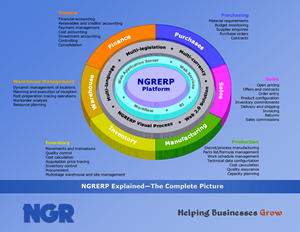Procurement Management
NGRERP's procurement functionality enables single and multi-facility manufacturing and distribution organizations to manage all purchasing and sourcing activities in a single, fully-integrated ERP software solution. NGRERP processes requisitions and purchase orders in real-time that tie directly to inventory receipts and vendor invoices to enable three-way matching. Purchase requisitions and purchase orders can be entered manually or automatically generated through NGRERP's material requirements planning (MRP) and distribution requirements planning (DRP) processes. In addition, NGRERP supports import management including containerization and landed costing. NGRERP's procurement functionality tracks and analyzes vendors' ongoing performance against a series of key metrics to reduce procurement-related costs and improve business profitability.
Vendor Definition
NGRERP's vendor master file centralizes all key vendor information such as remit-to and mail-to addresses, contact information, payment terms, and credit limits. The vendor mast file also provides a mechanism for grouping suppliers for reporting and payment purposes.
Purchase Requisitions
NGRERP software supports the creation and review of online purchase requisitions. Purchase requisitions can be entered manually or automatically generated through NGRERP's material requirements planning (MRP) and distribution requirements planning (DRP) processes. Purchase requisitions can be created for materials, products, packaging supplies, and services for one or multiple facilities.
Purchase Orders
NGRERP's procurement functionality supports both the entry of manual purchase orders and the automatic generation of purchase orders from purchase requisitions. For multi-facility organizations, NGRERP's purchasing functionality can be used for centralized purchasing, facility-based purchasing, or as a combination of these methodologies. NGRERP supports purchase orders for stock and non-stock items, drop shipments, and outsourced assembly. NGRERP also supports blanket purchase orders and associated releases. Purchase orders, associated receipts, and vendor invoices enable three-way matching in NGRERP.
Import Management
The NGRERP business software solution supports import management including containerization and landed costing. NGRERP enables purchasing personnel to review purchasing data and generate purchase orders for full or partial container loads. On a purchase order-by-purchase order basis, NGRERP stores and tracks key information such as estimated shipment, on-board, required, and actual received dates, slip sheet cost, container ID, and vessel ID.
Online RFQ Management
The NGRERP business management system supports fully-integrated request for quote (RFQ) processing. In NGRERP, purchasing personnel can create RFQ's, select desired vendors for inclusion, distribute the RFQ's, collect and evaluate vendor responses, and electronically send vendor award notifications. Purchasing personnel can review RFQ history and vendor performance data as part of determining which vendors to include in a given RFQ process. Vendor responses can be entered into NGRERP either through manual processes or directly by the vendor via a secure e-Commerce portal over the Internet. Once the vendor has been selected, purchase requisitions and purchase orders can be created directly from the RFQ.
Supplier Relationship Management
NGRERP features a complete supplier relationship management (SRM) software solution. NGRERP's SRM software functionality includes features designed to allow the enterprise to interact with suppliers on a daily basis. NGRERP's supplier relationship management software delivers (1) supplier contact management with an infinite number of contacts per supplier; (2) the establishment of preferred, approved and potential suppliers by individual facility and product; (3) supplier contracts by facility and product; (4) vendor Request for Quote (RFQ) processing, including awarding business by vendor, comparative analysis of the responses from each vendor, and the ability to have each vendor utilize a specific URL to provide their RFQ responses; (5) pricing history by supplier, including volume discounts on a currency or units purchased basis and customer or customer-product specific basis; (6) vendor rebates by product or a combination of products and customers; and (7) supplier performance management to continually track and analyze a given supplier’s ongoing performance against a series of key metrics.

